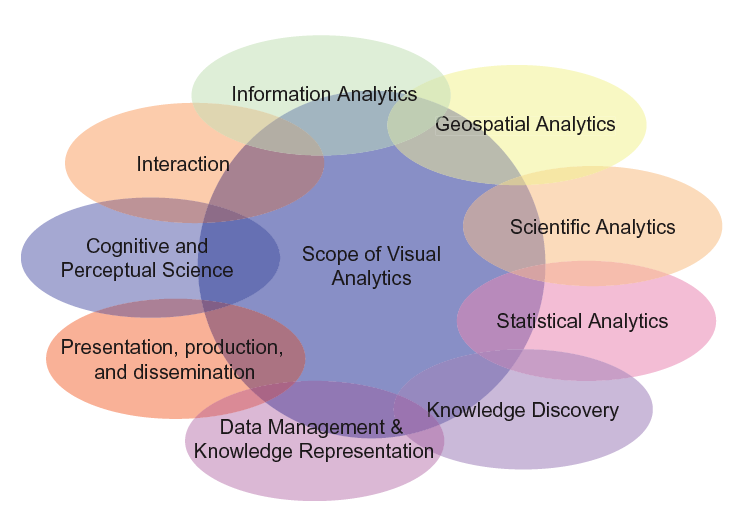Visual Analytics: Difference between revisions
Jump to navigation
Jump to search
No edit summary |
(added Link to "Visual Analytics Digital Library") |
||
| Line 12: | Line 12: | ||
{{Quotation|'''Visual analytics''' is more than just visualization and can rather be seen as an integrated approach combining [[visualization]], [[human factors]] and [[data analysis]]. ... With respect to the field of [[visualization]], visual analytics integrates methodology from information analytics, geospatial analytics, and scientific analytics. Especially human factors (e.g., interaction, cognition, perception, collaboration, presentation, and dissemination) play a key role in the communication between human and computer, as well as in the decisionmaking process.|[Keim et al., 2006]}} | {{Quotation|'''Visual analytics''' is more than just visualization and can rather be seen as an integrated approach combining [[visualization]], [[human factors]] and [[data analysis]]. ... With respect to the field of [[visualization]], visual analytics integrates methodology from information analytics, geospatial analytics, and scientific analytics. Especially human factors (e.g., interaction, cognition, perception, collaboration, presentation, and dissemination) play a key role in the communication between human and computer, as well as in the decisionmaking process.|[Keim et al., 2006]}} | ||
== Related Links == | |||
*[http://vadl.cc.gatech.edu/ Visual Analytics Digital Library] | |||
== References == | == References == | ||
Revision as of 15:28, 4 December 2006
Visual analytics is the science of analytical reasoning facilitated by interactive visual interfaces. [Thomas and Cook, 2006]
People use visual analytics tools and techniques to synthesize information and derive insight from massive, dynamic, ambiguous, and often conflicting data; detect the expected and discover the unexpected; provide timely, defensible, and understandable assessments; and communicate assessment effectively for action.
Visual analytics is a multidisciplinary field that includes the following focus areas:
- analytical reasoning techniques that let users obtain deep insights that directly support assessment, planning, and decision making;
- visual representations and interaction techniques that exploit the human eye’s broad bandwidth pathway into the mind to let users see, explore, and understand large amounts of information simultaneously;
- data representations and transformations that convert all types of conflicting and dynamic data in ways that support visualization and analysis; and
- techniques to support production, presentation, and dissemination of analytical results to communicate information in the appropriate context to a variety of audiences.
[Thomas and Cook, 2005, 2006]

[Keim et al., 2006]
Visual analytics is more than just visualization and can rather be seen as an integrated approach combining visualization, human factors and data analysis. ... With respect to the field of visualization, visual analytics integrates methodology from information analytics, geospatial analytics, and scientific analytics. Especially human factors (e.g., interaction, cognition, perception, collaboration, presentation, and dissemination) play a key role in the communication between human and computer, as well as in the decisionmaking process.
[Keim et al., 2006]
Related Links
References
- [Keim et al., 2006] Keim, D.A.; Mansmann, F. and Schneidewind, J. and Ziegler, H., Challenges in Visual Data Analysis, Proceedings of Information Visualization (IV 2006), IEEE, p. 9-16, 2006.
- [Thomas and Cook, 2005] J.J. Thomas and K.A. Cook, eds., Illuminating the Path: The Research and Development Agenda for Visual Analytics, IEEE CS Press, 2005.
- [Thomas and Cook, 2006] James J. Thomas and Kristin A. Cook., IEEE Computer Graphics and Applications, 26(1):10-13, January/February, 2006.